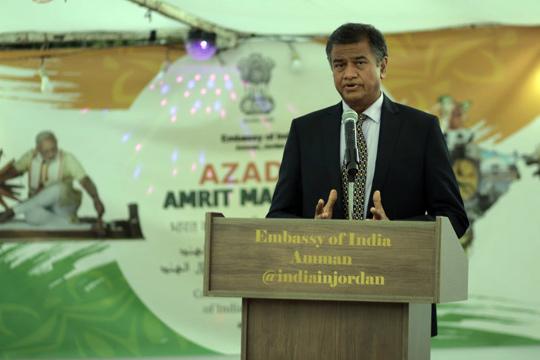You are here
Envoy hails ‘cordial’ India-Jordan ties as embassy marks Republic Day
By Maram Kayed - Jan 25,2020 - Last updated at Jan 25,2020

Anwar Haleem
AMMAN — Indo-Jordanian ties have always been “cordial and trustworthy”, Indian ambassador to Jordan Anwar Haleem said.
Speaking to The Jordan Times on the occasion of the country’s Republic Day, which is marked on January 26, the envoy said that the “similarity of the traditions between India and Jordan is the cornerstone of the two countries’ relations”.
“At the highest level, between the leaderships and the people, Jordan and India share common respect, understanding and values, he said.
Twelve memoranda of understanding were signed between the two countries when His Majesty King Abdullah visited India in 2018.
With Jordan as one of India’s five largest trading partners, the volume of trade and commerce between the two countries amounts to $2 billion, and the aim is for this number to reach $5 billion, according to the embassy.
Recognising Jordan as a potential “trade, culture and IT hub” for the Arab region, Ambassador Haleem said that India hopes to “contribute more towards the aspirations, progress and growth of Jordan”.
Describing Jordan as the “leading light” in the region, the ambassador said that His Majesty’s visit to India “left an imprint” on the country and that “India will cherish its partnership and friendly ties with the Hashemite Kingdom of Jordan”.
Haleem reiterated that India’s constitution is the “source of law in India” for its 1.3 billion citizens.
“We, the people of India, having solemnly resolved to constitute India into a sovereign, socialist, secular, democratic republic…” the first few words of the preamble to the constitution of India read.
“We firmly dedicate ourselves to our constitution, as without our constitution there would be no policies, no elections, no governance,” he told The Jordan Times.
After India achieved its independence on August 15, 1947, the Constitution of India was adopted by the Constituent Assembly on November 26 and came into force on January 26, 1950. According to Haleem, January 26 was chosen due to its historical significance dating back to 1929.
On the same day in 1929, the Declaration of Indian Independence (Purna Swaraj) was proclaimed by the Indian National Congress, as opposed to the Dominion status offered by the British colonial regime.
“It was our first promise of independence, and then, when our independence bore fruit, the people decided India should be a republic, because it was the people who led the freedom struggle to overthrow the British rule and colonialism,” he added.
The values of society before and after independence were determined by the will of the people, according to the ambassador, and “all agreed that justice, liberty, equality and fraternity should be ingrained in their constitution”.
With the executive, legislative and judicial branches, which check and balance each other, the constitution remains unchanged except for a few minor amendments, he noted, adding that “legislation is there to draft new laws, but the constitution, a basic document to our country, remains untouched”.
Related Articles
AMMAN — The Indian embassy in Amman on Sunday launched the “Azadi Ka Amrit Mahotsav” cultural festival to commemorate the 75th year of India
India’s Ambassador to Jordan Anwar Haleem on Tuesday inaugurated the week-long Indian Food Festival at Rakoon Indian restaurant in Jub
AMMAN — India’s Ambassador to Jordan Anwar Haleem highlighted the “commonalties of ideas and principles” between Amman and New Delhi.Speakin


















